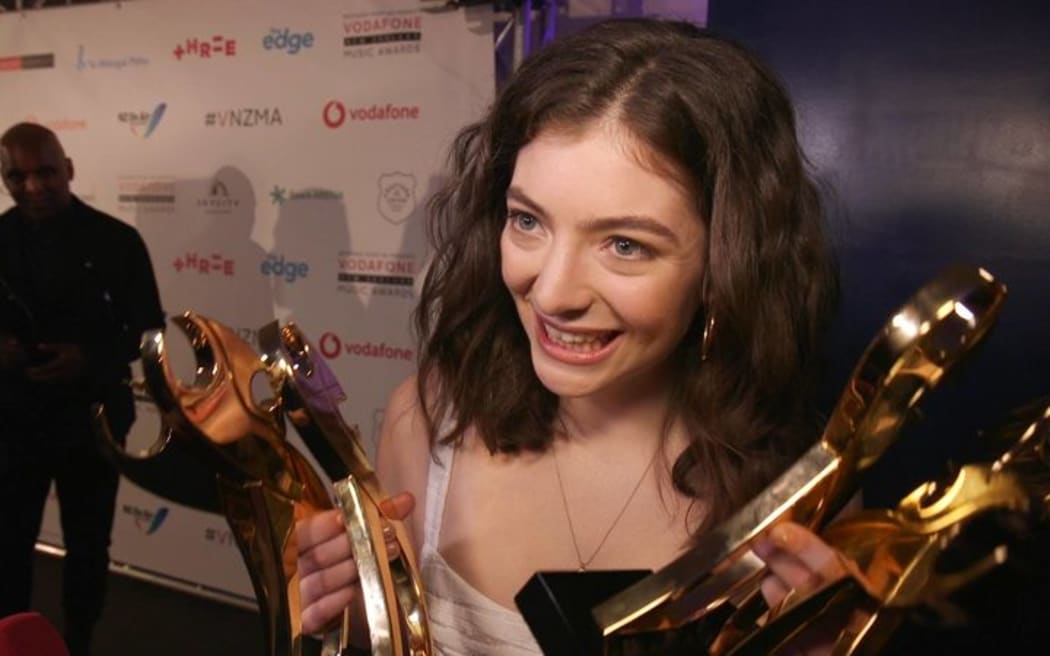
Lorde holding her multiple Tuis at the NZ Music Awards in 2017. Photo: RNZ
I’ve been pondering the point of music awards this year. Who are they for? What are they for? Should musicians and their art be pitted against each other? And you knew Lorde was going to win everything anyway, didn't you?
At its core, it’s a public relations exercise. It’s the most amount of mainstream television airtime musicians get these days. They are also about sales figures - it’s no coincidence the VNZMAs happen just before Christmas, but do they lead to any kind of sales spike?
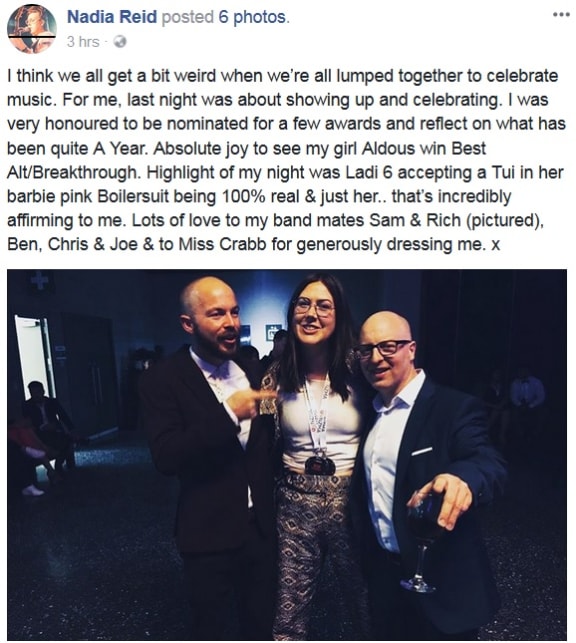
Nadia Reid Facebook post, post VNZMA's Photo: Facebook
A lot of musicians approach them like the work functions they are. They get glammed up in dresses they probably can’t afford, take advantage of the sponsors’ free booze, maybe they even take the chance to work the room, get in some paparazzi shots. And it’s a chance to catch up with friends and colleagues - a welcome respite from the often isolating and lonely experience of being a musician. It’s a good party, by most accounts.
But it’s 2017, and almost all of the old music business model is gone, and with it, the highly paid record execs, the limousines and the champagne. Most musicians in this country struggle to pay rent, and have to seriously consider whether they can afford to do things like have a family. So is a lavish, glitz and glamour awards ceremony the best way of celebrating artistry, creativity and success?
The goofy shock jock hosts, the high (high!) heeled, bone-thin women/props handing over the awards, the empty acceptance speeches and industry backslapping: it’s all a bit 20th Century. Let’s start with getting rid of these anachronisms.
But who are those two ladies who are just standing on the stage in identical dresses occassionally holding things. they haven't been introduced or anything plz tell me this isn't some sort women as background decoration trope
— indi. (@IndiForce) November 16, 2017
The Grammy Awards receive more backlash every year, for their conservative choices and lack of diversity. More big artists are boycotting, and at some stage the organisers will have to react.
Here in New Zealand, at least those at the top have heard the calls from the underground, and have subsequently made changes.
Gone is a separate category for women - we’re doing just fine and can compete on an equal footing, as demonstrated by the rising international profiles of Lorde, Aldous Harding, Fazerdaze, and Nadia Reid. In their wake, other young female musicians will follow.
The ditching of men’s and women’s categories also means gender diverse artists are no longer excluded from what was a binary competition.
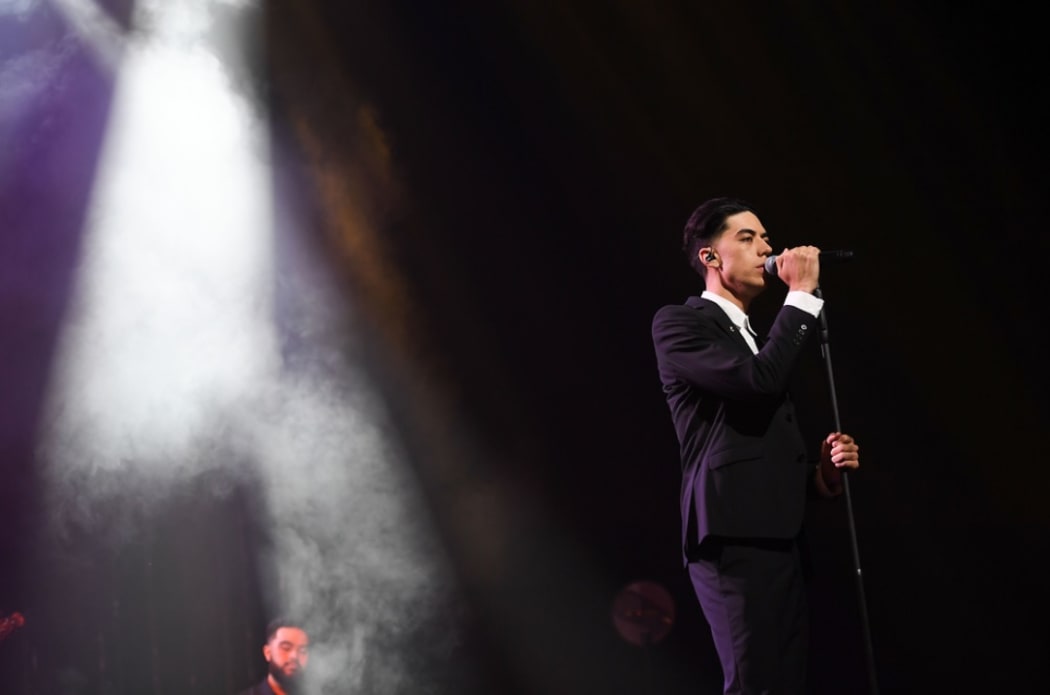
Teeks, winner of 'Best Maori Artist' at the 2017 VNZMA's. Photo: Topic/ Hannah Rolfe
Should we now be taking a look at race-based categories? We have so many talented and prominent Māori musicians it’s easy to wonder why ‘Best Māori Artist’ is still a thing. Maybe for someone like Teeks, who has the goods to be a household name, this is a great starter to get that mainstream recognition.
But what message are we sending our rangatahi when the only awards a superstar like Maisey Rika gets is in these special Māori categories? She pulled out of the ‘Best Māori Artist’ category this year, apparently as a gesture of “her great support of the upcoming talent of Māori artists in the industry.”
But was that the only reason? Obviously diversity in the judging pool is paramount to getting diversity in the awards, and this is something Recorded Music New Zealand chief executive Damian Vaughan, who run the NZ Music Awards, assures us they’re aware of, and pushes for.
Over 200 people from throughout the music industry are involved in the voting process for the VNZMAs, although their names are kept secret. A sales weighting of 30 percent is accounted for in six of the awards, which means that they’re always going to appear the most ‘commercial’ of NZ Music awards.
Voting systems are never going to be perfect. The Silver Scrolls - chosen by votes from APRA’s 10,000 members - responded to quiet criticism in 2016 by switching to preferential voting, which seems more fair. But it’s difficult when only 20 percent of the membership actually vote.
Voting for the Scrolls should be made easier - perhaps with only five songs instead of 20 to vote on, members would actually listen to them. Then maybe we’d see a more diverse crop of winners. There seemed to be a collective eye-roll in the room when Lorde won the 2017 Scroll - including from Ella herself. Too predictable.
Is putting music into little genre boxes outdated and limiting in this age where a lot of artists consider themselves ‘post-genre’ and take inspiration from anything their streaming service serves up on their discovery playlist?
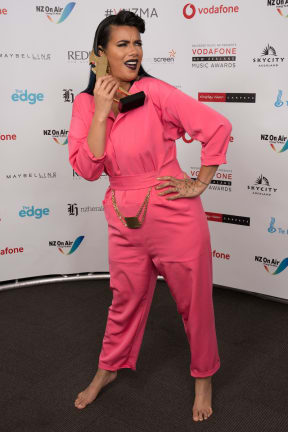
Ladi6 / Karoline Tamati with her Soul/RnB NZ Music Award Photo: Topic/ James Ensing-Trusselle
Artists, or their record labels and managers are asked to place themselves into these categories, even if - as Aaradhna pointed out last year - it doesn’t quite fit with the music they make. But Aotearoa is a small country - if there was a category for every style of music made here (as the Grammys have) there might be just one or two finalists in each. So I can understand why it needs to be streamlined.
It seems that the more niche awards, the ones that aren’t given out at the big televised show, are the more valuable in terms of exposure for acts to their core audiences.
The Tui award for Country music is announced at Gore’s Golden Guitars, the Jazz and Folk awards at the biggest NZ festivals for those styles, and music for children is celebrated at a family fun day. And anecdotally, that approach has paid off for a lot of artists.
Lucy Hiku of Itty Bitty Beats said the duo's Children’s music awards wins have motivated them and strengthened their networks.
“Sometimes it's easy to give up in this industry, and knowing people value our mahi certainly helped with our momentum. It has helped us get played on international radio stations and be in the media a bit more ... it hasn't so much translated into sales but it has helped get us some gigs I think.”
I wonder how long before the genre-specific categories like rock, electronic and roots get their own celebrations. Would that only make the silos of the local music scenes even more defined?
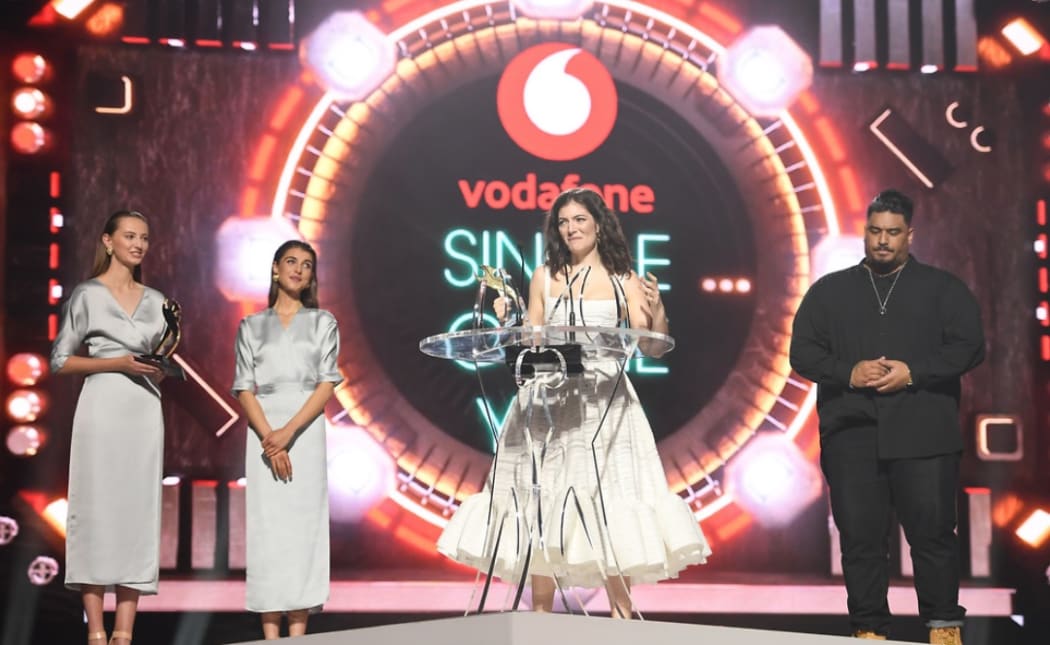
Lorde accepting the award for single of the year at the NZ Music Awards 2017 Photo: Topic/ Hannah Rolfe
Watching Lorde win award after award last night, with well-oiled humbleness, made me question if she wanted to be nominated in some of the categories at all. I’m fairly sure she’s the kind of artist who would want other, less well known but just as well thought of, artists to be recognised in these local awards.
Is it her label, Universal Music, putting in the nominations in the hope of selling a few more records if she wins? But then, it wouldn’t be an accurate reflection of the best music of 2017 if she was absent.
The VNZMAs need her, more than she needs them. Admirably, she used her platform to throw a light on some great causes like Youthline, Rainbow Youth, and The Aunties. She understands the responsibility that comes with her status.
Every musician and act has a different measure of success. For an act like Ladi6, it might be having a financially sustainable and creatively fulfilling career.
For Lorde, it‘s different - her ambitions are clearly limitless, and she has the talent to be one of the great artists of our time.
What part do winning local music awards have in the career trajectory of artists like these?
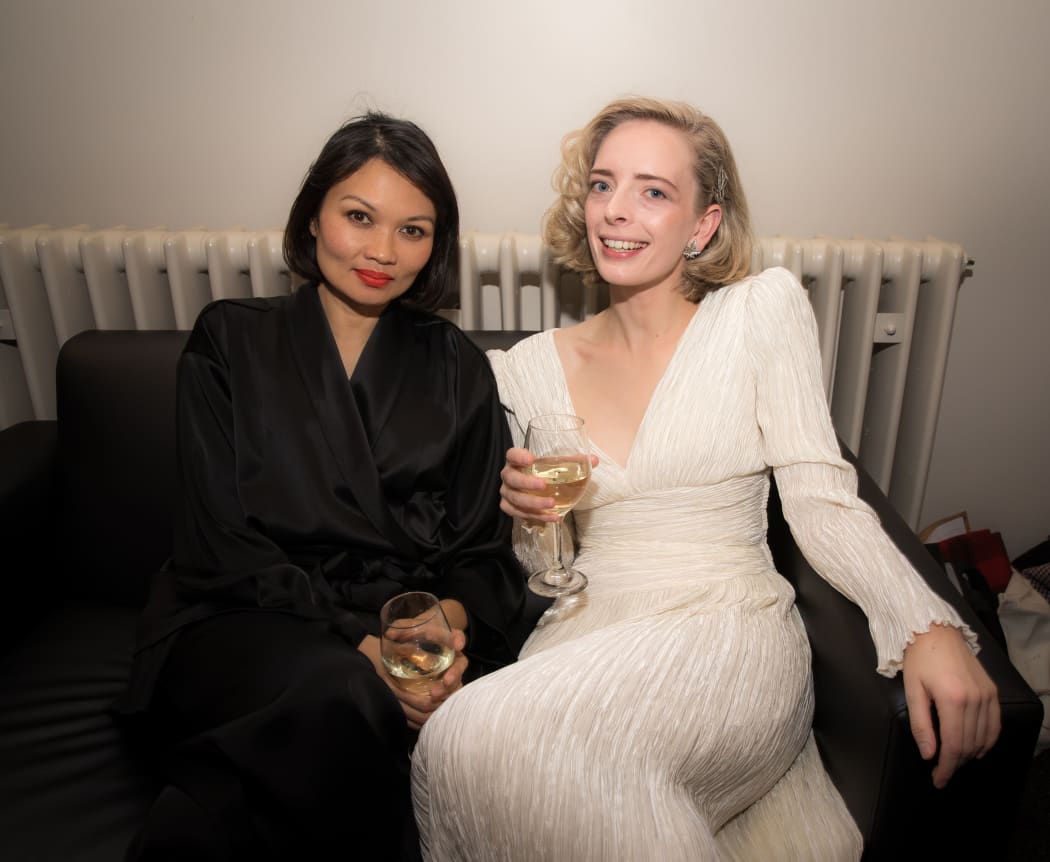
Bic Runga and Chelsea Jade at the Silver Scrolls 2017 Photo: RNZ / Cole Eastham-Farrelly
While it must be a boost, they’re not what making music is all about. Chelsea Jade and Bic Runga put it well at the Silver Scrolls in September, where they were finalists.
“It’s not boxing, where there’s a clear winner.” says Bic.
“We’ve already won” says Chelsea. “We’re in this sick club together, we’re on a really nice shortlist. Anytime anyone makes it feel like a competition, I’m like, you guys don’t get it.”
Everyone nominated last night, and everyone giving this hard career choice a crack - making audiences feel something, making us dance, laugh, think or cry - you’re all winners in my eyes.

